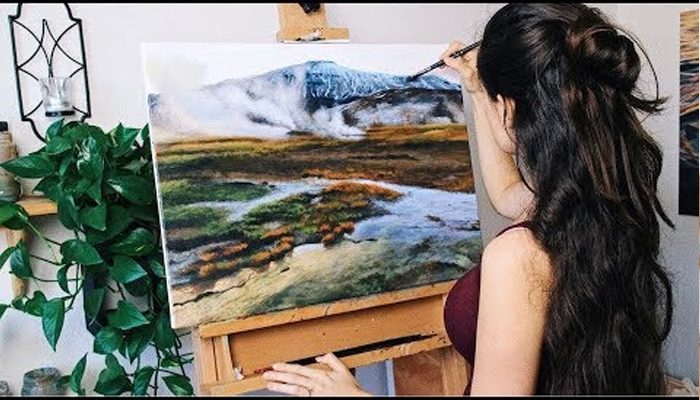
There’s something special about returning to an old hobby. Maybe it’s a craft you used to enjoy, a musical instrument you once played, or a quiet pastime that brought you peace. Over the years, many of us set these interests aside — often because life got busy. Careers, families, responsibilities… they all asked for our time and energy. But those hobbies didn’t disappear. They’ve just been waiting.
Rediscovering a past interest can feel like reuniting with an old friend. It brings a sense of comfort, joy, and even identity. And the best part? There’s no pressure to be perfect. Now is the time to enjoy the process, not chase performance. If you’ve been feeling the pull to pick something up again — or you’re simply curious about what you used to love — here’s how to make space for it once more.
Start by Thinking About What Lit You Up

Try to remember what used to make you lose track of time. Was it painting with watercolors on a Sunday afternoon? Taking photos on road trips? Tending to a small garden? Think back to your teens, your 20s, or even your childhood. Often, the things that brought us joy early in life still have something to offer — even if our style or energy has changed.
It helps to write a short list. Don’t worry about whether you were “good” at the hobby. What matters is how it made you feel. That sense of creativity, focus, or peace is what you’re looking to bring back into your life.
Let Go of the Expectation to “Be Good”
When returning to something after years — or even decades — it’s easy to feel rusty. Your hands may not move as easily, or your brain might need more time to remember how things work. That’s okay. The goal isn’t to impress anyone. You’re not auditioning or competing. You’re simply reconnecting with something that once brought you happiness.
Give yourself permission to be a beginner again, even if you’re picking up something you used to know well. That kind of self-kindness makes it easier to enjoy the hobby without judgment or pressure.
Make It Easy to Start

Sometimes the hardest part of revisiting a hobby is getting over the “starting” hurdle. We overthink it. We wait for the perfect free weekend or the perfect setup. But often, the best approach is to make it as easy and low-pressure as possible.
Set up a small corner for your supplies. Keep your materials within reach. If you want to start writing again, open a blank notebook or document — don’t worry about what to say. Just start. A few minutes of practice can be more powerful than hours of planning.
Give Your Hobby a Place in Your Daily or Weekly Rhythm
Our schedules are usually built around things we have to do. But adding something you want to do can make a big difference in how your days feel. Even just 15–20 minutes can help you feel more energized and fulfilled.
You don’t have to block off hours at a time. Maybe you knit while watching a show in the evening. Or you sketch a flower from the backyard after breakfast. These small, regular moments add up — and they gently build the habit back into your life.
Join a Group or Class if You Want Community

While solo hobbies can be peaceful, sometimes it’s nice to share your interest with others. Look for local clubs, online groups, or community center classes. Whether it’s a painting circle, a book discussion, or a gardening club, being around people who share your enthusiasm can be motivating and fun.
It’s also a good way to stay committed. If you know you’re meeting others every week to work on a project or talk about progress, it’s easier to stick with the habit — and you get the bonus of making new connections along the way.
Use the Hobby as a Way to Relax, Not Achieve
We live in a world that often tells us everything needs a goal: lose weight, be productive, reach the next level. But your hobby doesn’t need an outcome. You don’t have to sell your crafts, perform your music, or publish your writing. You’re allowed to simply enjoy it.
Let the process be enough. If you’re painting, focus on the colors. If you’re playing piano, enjoy the way your fingers move over the keys. These moments of quiet presence are what make hobbies such powerful forms of self-care.
Let It Change Along With You

Maybe you used to love baking cakes, but now you prefer making savory breads. Or maybe you once loved fast-paced dance, but now prefer something slower, like tai chi or gentle stretching. That’s perfectly fine. Hobbies, like people, evolve over time.
Don’t feel you have to return to the exact version of the hobby you once knew. Let yourself explore new styles, new techniques, or even totally new directions within the same interest. You’re not going backward — you’re building something new from something familiar.
Celebrate the Feeling, Not Just the Result
When you finish a page in your sketchbook, play through a song, or plant a few new flowers, take a moment to notice how you feel. Proud? Calm? Excited? That emotional response is what your hobby gives you — and it’s worth celebrating.
You don’t need anyone else’s validation to make it meaningful. If it makes your day feel a little brighter or your heart feel a little fuller, it’s already doing its job.
